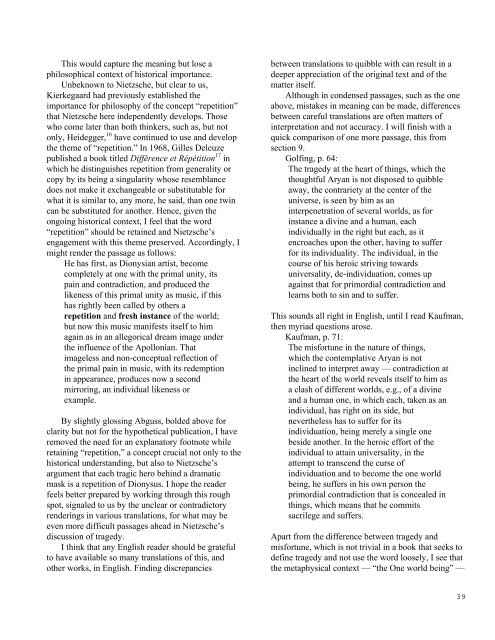their - The University of Texas at Dallas
their - The University of Texas at Dallas
their - The University of Texas at Dallas
Create successful ePaper yourself
Turn your PDF publications into a flip-book with our unique Google optimized e-Paper software.
This would capture the meaning but lose a<br />
philosophical context <strong>of</strong> historical importance.<br />
Unbeknown to Nietzsche, but clear to us,<br />
Kierkegaard had previously established the<br />
importance for philosophy <strong>of</strong> the concept “repetition”<br />
th<strong>at</strong> Nietzsche here independently develops. Those<br />
who come l<strong>at</strong>er than both thinkers, such as, but not<br />
only, Heidegger, 16 have continued to use and develop<br />
the theme <strong>of</strong> “repetition.” In 1968, Gilles Deleuze<br />
published a book titled Différence et Répétition 17 in<br />
which he distinguishes repetition from generality or<br />
copy by its being a singularity whose resemblance<br />
does not make it exchangeable or substitutable for<br />
wh<strong>at</strong> it is similar to, any more, he said, than one twin<br />
can be substituted for another. Hence, given the<br />
ongoing historical context, I feel th<strong>at</strong> the word<br />
“repetition” should be retained and Nietzsche’s<br />
engagement with this theme preserved. Accordingly, I<br />
might render the passage as follows:<br />
He has first, as Dionysian artist, become<br />
completely <strong>at</strong> one with the primal unity, its<br />
pain and contradiction, and produced the<br />
likeness <strong>of</strong> this primal unity as music, if this<br />
has rightly been called by others a<br />
repetition and fresh instance <strong>of</strong> the world;<br />
but now this music manifests itself to him<br />
again as in an allegorical dream image under<br />
the influence <strong>of</strong> the Apollonian. Th<strong>at</strong><br />
imageless and non-conceptual reflection <strong>of</strong><br />
the primal pain in music, with its redemption<br />
in appearance, produces now a second<br />
mirroring, an individual likeness or<br />
example.<br />
By slightly glossing Abguss, bolded above for<br />
clarity but not for the hypothetical public<strong>at</strong>ion, I have<br />
removed the need for an explan<strong>at</strong>ory footnote while<br />
retaining “repetition,” a concept crucial not only to the<br />
historical understanding, but also to Nietzsche’s<br />
argument th<strong>at</strong> each tragic hero behind a dram<strong>at</strong>ic<br />
mask is a repetition <strong>of</strong> Dionysus. I hope the reader<br />
feels better prepared by working through this rough<br />
spot, signaled to us by the unclear or contradictory<br />
renderings in various transl<strong>at</strong>ions, for wh<strong>at</strong> may be<br />
even more difficult passages ahead in Nietzsche’s<br />
discussion <strong>of</strong> tragedy.<br />
I think th<strong>at</strong> any English reader should be gr<strong>at</strong>eful<br />
to have available so many transl<strong>at</strong>ions <strong>of</strong> this, and<br />
other works, in English. Finding discrepancies<br />
between transl<strong>at</strong>ions to quibble with can result in a<br />
deeper appreci<strong>at</strong>ion <strong>of</strong> the original text and <strong>of</strong> the<br />
m<strong>at</strong>ter itself.<br />
Although in condensed passages, such as the one<br />
above, mistakes in meaning can be made, differences<br />
between careful transl<strong>at</strong>ions are <strong>of</strong>ten m<strong>at</strong>ters <strong>of</strong><br />
interpret<strong>at</strong>ion and not accuracy. I will finish with a<br />
quick comparison <strong>of</strong> one more passage, this from<br />
section 9.<br />
Golfing, p. 64:<br />
<strong>The</strong> tragedy <strong>at</strong> the heart <strong>of</strong> things, which the<br />
thoughtful Aryan is not disposed to quibble<br />
away, the contrariety <strong>at</strong> the center <strong>of</strong> the<br />
universe, is seen by him as an<br />
interpenetr<strong>at</strong>ion <strong>of</strong> several worlds, as for<br />
instance a divine and a human, each<br />
individually in the right but each, as it<br />
encroaches upon the other, having to suffer<br />
for its individuality. <strong>The</strong> individual, in the<br />
course <strong>of</strong> his heroic striving towards<br />
universality, de-individu<strong>at</strong>ion, comes up<br />
against th<strong>at</strong> for primordial contradiction and<br />
learns both to sin and to suffer.<br />
This sounds all right in English, until I read Kaufman,<br />
then myriad questions arose.<br />
Kaufman, p. 71:<br />
<strong>The</strong> misfortune in the n<strong>at</strong>ure <strong>of</strong> things,<br />
which the contempl<strong>at</strong>ive Aryan is not<br />
inclined to interpret away — contradiction <strong>at</strong><br />
the heart <strong>of</strong> the world reveals itself to him as<br />
a clash <strong>of</strong> different worlds, e.g., <strong>of</strong> a divine<br />
and a human one, in which each, taken as an<br />
individual, has right on its side, but<br />
nevertheless has to suffer for its<br />
individu<strong>at</strong>ion, being merely a single one<br />
beside another. In the heroic effort <strong>of</strong> the<br />
individual to <strong>at</strong>tain universality, in the<br />
<strong>at</strong>tempt to transcend the curse <strong>of</strong><br />
individu<strong>at</strong>ion and to become the one world<br />
being, he suffers in his own person the<br />
primordial contradiction th<strong>at</strong> is concealed in<br />
things, which means th<strong>at</strong> he commits<br />
sacrilege and suffers.<br />
Apart from the difference between tragedy and<br />
misfortune, which is not trivial in a book th<strong>at</strong> seeks to<br />
define tragedy and not use the word loosely, I see th<strong>at</strong><br />
the metaphysical context — “the One world being” —<br />
39

















